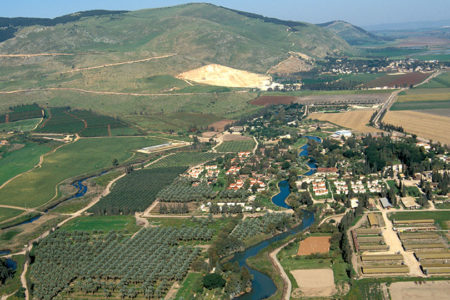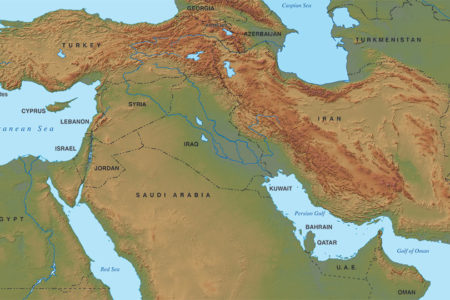When Israel Sins
It was one of those truly soul-rattling moments (metaphorically speaking). In the heart of Jerusalem, the Israeli Supreme Court rendered a ruling that seems to betray one of God’s clearest examples of judgment as revealed in the book of Genesis and that would have engendered the harsh condemnation of numerous Old Testament prophets. Last year the high court cleared the way for the world “pride” event held in the streets of Jerusalem in November 2006 to celebrate the rights of homosexuals and lesbians.
A Jerusalem District Court also fined Mayor Uri Lupolianski, an observant Jew, for trying to halt the Gay Pride parade. Haaretz reported, “Lupolianski has said in the past that such a parade in Jerusalem was comparable to ‘a pig’s head on Al-Aqsa [mosque].’”1
It was only when Hezbollah began assaulting Israel in July that the event scheduled for August 2006 had to be postponed to November 10.
In a not totally unrelated incident, Israel Supreme Court President Aharon Barak said, “The lack of civil marriage in Israel is a major violation of human rights,” noting the Knesset’s failure to pass a form of civil union to accommodate nonreligious Israelis. Currently all Israelis must have religious ceremonies, and the Orthodox control the religious courts in the Jewish sector.2
It doesn’t take too much imagination to figure out that if such a measure were passed, gay rights activists would quickly press for government-recognized “unions.”
The question then becomes, “How does the Christian church respond to such developments?” Should evangelicals, for example, halt their support for Israel?
Such reasoning collides with what the Bible tells us about Israel; beyond that, it reveals a lack of understanding as to why Christians should uphold that tiny, beleaguered nation in the first place.
A Judgment Most Fearsome
Over the years I have heard the long litany of arguments that attempt to reconcile Scripture with the practice of homosexuality. These cover the gamut from the merely unbiblical and theologically incompetent to the almost too ridiculous to believe. The inescapable truth is that, from beginning to end, the Bible gives a wholesale, unequivocal condemnation of homo-sexuality. For those who want proof, check out a reliable translation of Leviticus 18:22; 20:13; Deuteronomy 23:17; Romans 1:26–27; and 1 Corinthians 6:9.
As for that old line about Jesus never condemning homosexuality, read Mark 10:6–8. When He spoke about intimate relationships, the Savior did not mention homosexuality. Clearly, He did not permit what He expressly omitted. The only relationships God blesses are those consistent with His design.
But when it comes to our attitude toward Israel as it dallies with the issue, a good place to focus might be that infamous event at Sodom and Gomorrah. It is an account we think we already know. We recall, for instance, the description of fire from heaven coming down and consuming those debauched cities, the inhabitants, and even the vegetation (Gen. 19:24, 28).
The destruction was so catastrophic, and the sin that provoked it so audacious, that it is mentioned in eight books of the Old Testament. And in the New Testament it is referenced in 2 Peter, Jude, and Revelation. In the Gospels, Jesus authenticated the historicity of the event (Lk. 17:28–32). Significantly, He also pronounced the rejection of His saviorship as a more grievous offense by far than that committed by Sodom (10:11–12).
Yet there is something more in the story of Sodom and Gomorrah.
A National Lesson
When it comes to Sodom and cities like it, there has been heated debate among secular archaeologists and historians. They don’t accept the Bible account, but they do find the issue of the geographical location fascinating. For instance, by looking at the ancient linguistic references to the cities of that area, Dr. Charles Pellegrino opined in his 1994 book, Return to Sodom and Gomorrah, that those two cities could well have not been in the region of the Dead Sea, thus rejecting the popular wisdom.
On the other hand, in a November/December 2001 issue of Biblical Archaeology Review, Amos Frumkin and Yoel Elitzur concluded that there is good evidence that at least the southern part of what is now the Dead Sea (dry land back then) was the site of the battle of the kings of Sodom and Gomorrah mentioned in Genesis 14:10.
One thing we do know, however: When Abraham (then Abram) separated from his nephew Lot, he chose Canaan. Lot opted for the Jordan Valley, a lush “garden” that included the “cities of the plain…as far as Sodom.” He chose it despite the fact that the inhabitants were notoriously known as “exceedingly wicked and sinful against the Lᴏʀᴅ” (Gen. 13:10–13).
Time passed. Then one day Abraham was trying to cool himself by the door of his tent when something in the shimmering desert heat caught his eye. Three men were approaching. There is reason to believe Abraham knew where they came from as he rushed out and “bowed himself to the ground” before them (18:2). Two were clearly angels. But the third is described as “the Lᴏʀᴅ”(vv. 13, 17, 20).
First, the Lord spoke about Abraham’s wife and announced that she miraculously would bear a son (vv. 9–15).
But then the Lord asked, “Shall I hide from Abraham what I am doing…?” (v. 17). It is an extraordinary moment in human history. The God of the universe was about to confide in a mere mortal and reveal His fearful and almost incomprehensible plan. God was about to visit the two decadent cities of the plains to evaluate their offenses. If they were as bad as the “outcry” He heard, He would destroy them utterly.
Why did God confide His plan to Abraham?
The answer is in verse 18: “since Abraham shall surely become a great and mighty nation, and all the nations of the earth shall be blessed in him.”
The Lord shared His design of justice and judgment with the man from whom the nation of Israel would ultimately spring. The lesson is clear. The nation of Israel must learn the lessons of righteousness, obedience, and moral responsibility, starting with father Abraham. That dreaded cataclysm somewhere near the Dead Sea was to become a powerful classroom for Israel. One can only wonder whether the lessons of Sodom so impressed themselves on Abraham’s heart that, years later, when called on to offer up his beloved son Isaac, he was better able to understand the need for obedience to God.
Lessons Forgotten
If we fast forward some 4,000 years, we see that Israel is now on the verge of a major episode of scriptural amnesia. It is a familiar story: a nation birthed by God’s hand slowly begins to drift away from Him.
Here in America we’ve “been there, done that.” Having gained our independence at the urging of men who believed in an all-powerful Creator and having established laws in conformity therewith (all 13 original states forbade homosexual conduct), our nation now seems to have forgotten the wisdom of its parentage.
In 1986, in Bowers v. Hardwick, the U.S. Supreme Court issued a clear, bold ruling that rejected the notion that homosexuality was entitled to legal protection. Then, less than two decades later, our high court reversed itself in an abrupt about-face. In Lawrence v. Texas, it ruled that Bowers had been an abject mistake and determined that it now was unconstitutional for a state to outlaw homosexual activity.
Now it seems that the scourge of political correctness has gone global (the Supreme Court in Lawrence cited international law), and Israel may soon be the next victim.
But even if that occurs, does it mean we cease our support for Israel?
The Covenant and the Conquest
There is a stunningly simple answer to the last question: Regardless of any examples of “national” immorality (or any number of other potential problems), we are still required to uphold the Jewish state. This is true because God’s covenant to grant it the land outlined in Scripture must be viewed as distinct from the issue of whether Israel has been successful in its moral conquest.
In Romans 9 the apostle Paul spoke at length about Israel. He pointed out that God’s choice of Israel was like His choice of Isaac over Esau: It was not based on anything Isaac did (“not of works”); rather, it was because “of Him who calls” (v. 11). God’s sovereignty is inscrutable.
In analyzing Romans 9, Profs. Mark Bailey and Tom Constable put it well in The New Testament Explorer commentary:
Because God’s election of Israel did not depend on natural descent (9:6–10) or human merit (9:11–13) Israel’s disobedience cannot nullify God’s sovereign purpose for the nation.3
If we look at the conquest of Canaan in the book of Joshua, we see a three-dimensional picture of this principle. It shows us the distinction between God’s covenant, which granted a complete transfer of the land to Israel, and Israel’s failure to complete the required conquest of the land.
Israel’s duty of conquest is not merely a military one, though it must exercise its lawful right of self-defense against the monstrous designs of terrorists and terrorist nations that would destroy it. Yet Israel must also perform a kind of moral conquest and thereby obey the demands of righteousness imposed by the Grantor of the land deed.
When Israel fails to do so, the Lord will deal with it. But that is the divine prerogative. For those of us who are His children, we should pray for, protest, urge, and encourage Israel to be what God desires it to become.
If we are to accept the whole written counsel of God, then rejecting Israel is not an option that has been left open to us.
ENDNOTES
- Itim, “High Court: Jerusalem’s gay pride parade to be held November 10,” September 18, 2006 <haaretz.com/hasen/spages/764381.html>.
- Hilary Leila Krieger and Dan Izenberg, “Israel’s chief justice backs civil marriage,” June 23, 2006, <jewishsf.com/content/2-0-/module/displaystory/story_id/29596/edition_id/558/format/html/displaystory.html>.
- Mark Bailey and Tom Constable, The New Testament Explorer (Nashville: Word Publishing, 1999), 277.






